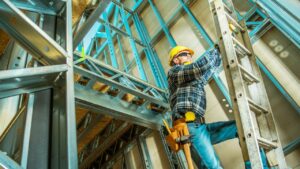Found the house of your dreams, but it’s made of concrete? Well, truth be told, getting a mortgage on a concrete house does come with it’s challenges.
Since concrete construction falls under the non-standard build category, it is considered riskier, making it harder to resell or insure.
Hence, it becomes imperative to consult an experienced broker and understand the stricter property surveys, higher interest rates, and deposits when it comes to concrete construction mortgages.
To help you out, we have curated this informative guide to concrete house mortgages, exploring the application process, the history of concrete construction, the eligibility criteria, and more.
Table of Contents
- Can You Get Concrete Construction Mortgages?
- Types Of Concrete Construction Houses And Mortgageability
- Why Is It Difficult To Get A Mortgage for Concrete Homes?
- Eligibility Criteria for Concrete Construction Mortgages
- How Long Do Concrete Homes Last?
- Can I Get A Mortgage On A Concrete Ex-council House?
- To Sum Up
Can You Get Concrete Construction Mortgages?
Yes, obtaining a mortgage for a concrete construction home is possible but it comes with unique challenges.
First of all, these homes are classified as “non-standard” builds, impacting approval probabilities.
Consequently, the lender pool for such mortgages is limited, so you might have to settle for less favourable terms, such as higher interest rates or deposits.
Lenders also perceive concrete houses as quite risky, especially because of the steel columns that are susceptible to erosion. This particular factor is what makes concrete houses harder to resell.
Notably, concrete homes using the Large Panel System (LPS) face more significant challenges in securing a mortgage.
On the other hand, In Situ Poured Concrete (IPC) or Precast Reinforced Concrete (PRC) properties may find acceptance, depending on renovation standards.
Types Of Concrete Construction Houses And Mortgageability
Determining the construction type of a potential property is crucial, as some are perceived as safer or riskier than others.
We recommend consulting a surveyor before finalising property transactions to identify specific risks of concrete houses and take corrective measures accordingly.
1. Hawksley Construction
Appearing as traditional brick houses, Hawksley constructions use PRC beams. Lenders accept them if part of a PRC homes repair scheme.
2. Reema Construction
Built with PRC panels, Reema homes, popular in the 1940s, often need renovation for mortgage eligibility. However, some properties from the 1960s may not require refurbishment.
3. Woolaway Construction Units
After WWII, Woolaway constructed varied homes using concrete frames. Lenders prefer a PRC certificate of completion to confirm renovation.
Read More: Mortgages For Steel Framed Homes
4. Cornish Units
Common in Cornwall, these units housed WWII returning soldiers. Lenders often require refurbishment under an approved scheme for mortgage extension.
5. Taylor Wimpey No Fines
Properties from the 1940s to the 1970s, known as Taylor Wimpey No Fines, boast quick construction and enhanced insulation. However, structural concerns may impact mortgage approval.
Employing a licensed structural engineer for repairs, validated by a PRC Certificate, enhances mortgage viability.
6. Dorran Constructions
Constructed in the 1950s, these single-storey homes feature moderately pitched gable roofs topped with concrete tiles and external walls. The latter is made of precast reinforced concrete panels (PRC) extending to the full height of the storey.
7. Other Types Of Concrete Houses
- Whitson Fairhurst PRC homes
- Wates Group PRC builds
- Orlit PRC
- Airey house constructions
- Unity PRC home
Many of the aforementioned housing types become more mortgageable with structural improvements and insulation enhancement. In some cases, you may have to add a brick “skin” to beautify the units and increase their resale value.
Plus, consulting with a knowledgeable broker streamlines the mortgage application process, ensuring alignment with lenders accepting specific construction types.
Why Is It Difficult To Get A Mortgage for Concrete Homes?
Concrete homes emerged in the 1950s to address the housing shortage in the UK after World War II.
Basically, the demand for affordable housing for returning soldiers and their families prompted the construction of precast reinforced concrete homes.
Unfortunately, by the 1980s, the structural issues made news as the steel reinforcement bars placed within the concrete began eroding.
Presently, many concrete homes still exist in the UK, although they are gradually being replaced by more contemporary construction methods. As such, concrete homes remain a viable option for those seeking affordable houses.
Overall, proper maintenance and care can extend the longevity of these homes, offering a durable and cost-effective housing solution amidst their historical challenges.
Eligibility Criteria for Concrete Construction Mortgages
Ensuring the approval of your mortgage application involves considering various factors that could significantly impact your eligibility. Here are some crucial aspects you must consider:
1. Type Of Property
Lenders often have preferences regarding property types. For instance, Scottish Widows, Halifax, and Santander may accept houses and bungalows but not maisonettes or flats.
A. Property Height
PRC properties exceeding two stories may face reluctance from certain lenders, even if they have undergone repairs.
B. Adjoining Properties
For a concrete home to be mortgageable, it usually must undergo structural repairs within an approved scheme.
However, if the property is semi-detached or part of a terrace, many lenders additionally require adjoining properties to undergo similar renovations and refurbishments.
Beyond the specific considerations for concrete construction properties, lenders adhere to standard requirements that influence mortgage approvals:
2. Deposit And LTV Ratio
A larger deposit improves the loan-to-value (LTV) ratio, making your application more appealing to lenders.
A reduced risk for lenders, thanks to a substantial deposit, often leads to more favourable terms and increased approval chances.
3. Income
Different lenders accept specific forms of income. Some may exclude bonuses or commissions when calculating your loan amount, while others consider them.
Note that the common income multiplier of 4.5-5 times your annual income, used by lenders to determine the mortgage amount, may vary based on income sources.
4. Credit History
Lenders assess your credit history, considering any past issues to gauge the risk associated with lending to you.
5. Age
Many lenders impose age restrictions for borrowers, with the minimum age typically set at 21 in the UK. Maximum age limits may vary, ranging from 70 to 80 years old.
Considering these diverse factors and understanding lender criteria beyond concrete construction specifics is essential for navigating the mortgage approval process successfully.
How Long Do Concrete Homes Last?
Concrete homes can last up to 50 years without structural repairs, though some may require renovations within 20-30 years, depending on construction methods or materials.
Interestingly, well-maintained concrete houses in the UK have even surpassed a century without major refurbishments.
As such, mortgage lenders require evidence of a repair plan and financing, as the duration of the mortgage may exceed the lifespan of the house. Clearly, without a clear repair strategy, obtaining a loan for a concrete house becomes challenging.
Can I Get A Mortgage On A Concrete Ex-council House?
It is possible to get a mortgage for ex-council properties with additional considerations, such as:
1. Type Of Property
Distinctions between houses and flats matter for ex-council houses too. Some lenders approach high-rise tower blocks cautiously, potentially making it more difficult to secure a mortgage for such properties.
2. Design
Lenders may hesitate to approve a loan if the property design lacks a separate kitchen from the main living area or if it is deemed too compact.
3. Tenure
Obtaining a mortgage might be more challenging for leasehold properties with a limited lease duration.
To Sum Up
Obtaining a mortgage on a concrete construction isn’t as straight forward as a standard construction property but there are lenders that can consider them.
Needless to say, the process requires a thorough understanding of property types and lender preferences.
From Taylor Wimpey No Fines to Cornish units, each concrete home type has its considerations, making professional advice essential.
Despite challenges like perceived risk and structural complexities, repair certifications can boost your chances of getting a concrete construction mortgage.
As concrete homes continue to exist in the UK, having relevant knowledge and consulting experienced brokers can help create a strong foundation for successful mortgage applications.
Your home may be repossessed if you do not keep up repayments on your mortgage.
All content is written by qualified mortgage advisors to provide current, reliable and accurate mortgage information. The information on this website is not specific for each individual reader and therefore does not constitute financial advice.
I am CeMAP & CERER qualified mortgage adviser and have helped a number of clients realise their dreams when they thought it would not be possible. I’m skilled at getting mortgages sorted for people with a history of missed payments, CCJs, defaults, debt management programmes, IVAs and bankruptcies.








